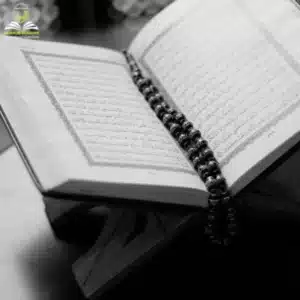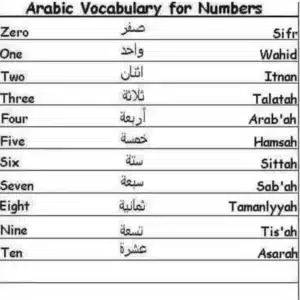When it comes to learning Arabic, you need to grasp the grammar of using Arabic numbers because you will need it to express many things in your daily life, such as prices, clocks, and understanding the Quran.
The Arabic numbers are not as hard as they seem, but they follow a straightforward pattern. Once you memorize this pattern and keep it in front of your eyes constantly, using Arabic numbers will be easier.
Using the Numbers in Dates
It's common knowledge that writing the date has many systems, even in the same language, like English. In the British system they write the date in this form: day/ month/ year and in the American system, they use this form: month/ day/ year.
However, writing the date in Arabic follows a specific form, which is: day/ month/ year. This form is reliable in all Arab countries and all dialects. So, you will not confuse them, as you can see it’s obvious.
Notably, Arabic writing starts from right to left, so when you want to write this date “9/7/2024”, you will start with the day “9” and write it down on the right, then the month “7”, and finally the year 2024 the last thing in the left.
Some Arab countries use the Hijri or Islamic calendar coupled with the Gregorian calendar, they use both. This calendar is lunar-based, so it’s different in the year, day, and even the month names. Overall, learning the Gregorian calendar is enough to communicate with Arabs.
The Grammar of Using Arabic Numbers
Arabic numbers' grammatical rules are simple if you follow these categories and practice on them regularly until you master them. Ready to dive into them? Let’s clarify each category in detail:
1-One and Two
The number “one” is written in a straightforward way and comes after the counted number, following its tashkeel. For instance, I have one book is written in Arabic in this way “أنا عندي كتابًا واحدًا”.
While “two” is written differently depending on its grammatical case within the sentence, you can write it “اثنان” or “اثنين” according to its grammatical position.
2-The Set of Numbers from 3 to 9
You can write them in the opposite gender of the counted noun that is following the number. When the counted noun is feminine, the number becomes masculine, and vice versa. For instance, the word “أقلام Pens” is masculine in Arabic, so the number will be feminine “ستة أقلام”. Thus, If I use the feminine counted word like “ورقة”, so the number will be masculine “ست ورقات”.
3-The Set of Numbers 11 and 12
They follow the same gender as the counted noun, if the counted noun is masculine, so the number is masculine and if the counted noun is feminine so the number is feminine too. For instance, the word “عام year” is masculine, so we write: “ أحد عشر عامًا”.
4-The Set of Numbers from 13 to 19
In these numbers, we consider the number to have two parts, like “سبعة عشر” we consider “سبعة” is the first part and “عشر” is the second part.
Their rule is that the first part is the opposite gender of the counted noun, while the second part agrees in gender with the counted noun. For instance, “كوب cup” is masculine, so when I want to write fifteen cups, I write “خمسة عشر كوبًا”.
The word “سماعة earphone” is feminine, so if I want to write seventeen headphones, I write it in this way “سبع عشرة سماعة”.
5-The Set of Tens “20, 30, etc…”
These numbers remain constant regardless of the counted noun. However, they form only changes based on their grammatical rule within a sentence. They can be “عشرون” or “عشرين” according to its grammatical position.
6-The Set of Compound Numbers That Are Ending in 1 and 2
They follow the same gender as the counted noun, the word “door باب” is masculine, so we write twenty-two doors in this way, “اثنان وعشرون بابًا”.
7-The Set of Compound Numbers That Are Ending in 3 to 9
They are the opposite gender of the counted noun. For instance, the word “طاولة table” is feminine, so when we want to write fifty-three tables, we write “ثلاث وخمسون طاولة”.
8-The Set of Hundreds and Their Multiples
These numbers like 100, 200, 400… etc don’t vary depending on the noun it describes, they are constant. For example: “مائة بقرة” and “مائة باب”, although the first counted noun is feminine and the second one is masculine, the word one hundred “مائة” is still the same.
Millions and Billions
They are the easiest numbers, as you don’t need to exert effort to memorize them. The word “مليون” in Arabic has the same pronunciation as “millions” in English. Yet, the word “billion” has another name in Arabic, which is “مليون”.
The equivalent of the plural of million, which is millions, in Arabic is “ملايين” which can be pronounced /malayeen/, and the equivalent of the plural of billion, which is billions, in Arabic is “مليارات” that can be pronounced /milyarat/.
When we want to write a big number "million and two hundred thousand" in Arabic, we start with the million and write it at the beginning of the sentence on the right, then the rest of the numbers. It will be “مليون ومائتان ألف” This is the easy way that we can write these big numbers in Arabic. Billions are likewise, we start with the bigger at the beginning of the sentence from the right and write “ثلاثة مليارات ومائتان مليون وثلاثمائة ألف”.
Numbers in Quran

The Holy Quran is written in Arabic, so it provides a definitive reference for the Arabic number system, which can be an excellent model to apply what we have learned in writing Arabic numbers. Let’s take a look at some verses from the Holy Quran and apply the above-mentioned rules:
1-The numbers from 3 to 9 we write them in the opposite gender of the counted noun:
الَّذِي خَلَقَ السَّمَاوَاتِ وَالْأَرْضَ وَمَا بَيْنَهُمَا فِي سِتَّةِ أَيَّامٍ ثُمَّ اسْتَوَىٰ عَلَى الْعَرْشِ
“He who created the heavens and the earth and what is between them in six days and then established Himself above the Throne….” [25:59]
اللَّـهُ الَّذِي خَلَقَ سَبْعَ سَمَاوَاتٍ وَمِنَ الْأَرْضِ مِثْلَهُنَّ
“It is Allah who has created seven heavens and of the earth, the like of them…” [65:12]
وَكَانَ فِي الْمَدِينَةِ تِسْعَةُ رَهْطٍ يُفْسِدُونَ فِي الْأَرْضِ وَلَا يُصْلِحُونَ
“And there were in the city nine family heads causing corruption in the land and not amending
2-The numbers 11 and 12 follow the same gender as the counted noun:
إِذْ قَالَ يُوسُفُ لِأَبِيهِ يَا أَبَتِ إِنِّي رَأَيْتُ أَحَدَ عَشَرَ كَوْكَبًا
“When Yusuf said to his father: O my father! Indeed I saw in a dream eleven stars…” [12:4]
إِنَّ عِدَّةَ الشُّهُورِ عِندَ اللَّـهِ اثْنَا عَشَرَ شَهْرًا
“Indeed, the number of months with Allah is twelve [lunar] months…” [9:36]
3-The units like 20, 30, 40, and so on remain constant regardless of the counted noun:
إِن يَكُن مِّنكُمْ عِشْرُونَ صَابِرُونَ يَغْلِبُوا مِائَتَيْنِ
“If there are among you twenty [who are] steadfast, they will overcome two hundred.“8:65
وَوَاعَدْنَا مُوسَىٰ ثَلَاثِينَ لَيْلَةً وَأَتْمَمْنَاهَا بِعَشْرٍ فَتَمَّ مِيقَاتُ رَبِّهِ أَرْبَعِينَ لَيْلَةً
“And We made an appointment with Moses for thirty nights and perfected them by [the addition of] ten; so the term of his Lord was completed as forty nights.” 7: 142
40. Arbaeen = Forty
قَالَ فَإِنَّهَا مُحَرَّمَةٌ عَلَيْهِمْ ۛ أَرْبَعِينَ سَنَةً ۛ يَتِيهُونَ فِي الْأَرْضِ
“[Allah] said, “Then indeed, it is forbidden to them for forty years [in which] they will wander throughout the land. ” 5:26
وَلَقَدْ أَرْسَلْنَا نُوحًا إِلَىٰ قَوْمِهِ فَلَبِثَ فِيهِمْ أَلْفَ سَنَةٍ إِلَّا خَمْسِينَ عَامًا
“And We certainly sent Noah to his people, and he remained among them a thousand years minus fifty years…” 29:14
فَمَن لَّمْ يَسْتَطِعْ فَإِطْعَامُ سِتِّينَ مِسْكِينًا
“…..and he who is unable – then the feeding of sixty poor persons…”
وَالَّذِينَ يَرْمُونَ الْمُحْصَنَاتِ ثُمَّ لَمْ يَأْتُوا بِأَرْبَعَةِ شُهَدَاءَ فَاجْلِدُوهُمْ ثَمَانِينَ جَلْدَةً
“And those who accuse chaste women and then do not produce four witnesses – lash them with eighty lashes” 24:4
4-The number 100 is the same:
مَّثَلُ الَّذِينَ يُنفِقُونَ أَمْوَالَهُمْ فِي سَبِيلِ اللَّـهِ كَمَثَلِ حَبَّةٍ أَنبَتَتْ سَبْعَ سَنَابِلَ فِي كُلِّ سُنبُلَةٍ مِّائَةُ حَبَّةٍ
“The example of those who spend their wealth in the way of Allah is like a seed [of grain] which grows seven spikes; in each spike is a hundred grains”. 2:261
فَإِن يَكُن مِّنكُم مِّائَةٌ صَابِرَةٌ يَغْلِبُوا مِائَتَيْنِ
“So if there are from you one hundred [who are] steadfast, they will overcome two hundred.” 8:66
وَلَبِثُوا فِي كَهْفِهِمْ ثَلَاثَ مِائَةٍ سِنِينَ وَازْدَادُوا تِسْعًا
“And they remained in their cave for three hundred years and exceeded by nine.” 18:25
5-The number thousand is the same as well:
وَلَقَدْ أَرْسَلْنَا نُوحًا إِلَىٰ قَوْمِهِ فَلَبِثَ فِيهِمْ أَلْفَ سَنَةٍ إِلَّا خَمْسِينَ عَامًا
“And We certainly sent Noah to his people, and he remained among them a thousand years minus fifty years…” 29:14
وَإِن يَكُن مِّنكُمْ أَلْفٌ يَغْلِبُوا أَلْفَيْنِ بِإِذْنِ اللَّـهِ
“And if there are among you a thousand, they will overcome two thousand by permission of Allah.” 8:66
إِذْ تَقُولُ لِلْمُؤْمِنِينَ أَلَن يَكْفِيَكُمْ أَن يُمِدَّكُمْ رَبُّكُم بِثَلَاثَةِ آلَافٍ مِّنَ الْمَلَائِكَةِ مُنزَلِينَ
“[Remember] when you said to the believers, “Is it not sufficient for you that your Lord should reinforce you with three thousand angels sent down?” 3:124
بَلَىٰ ۚ إِن تَصْبِرُوا وَتَتَّقُوا وَيَأْتُوكُم مِّن فَوْرِهِمْ هَـٰذَا يُمْدِدْكُمْ رَبُّكُم بِخَمْسَةِ آلَافٍ مِّنَ الْمَلَائِكَةِ مُسَوِّمِينَ
“Yes, if you remain patient and conscious of Allah and the enemy come upon you [attacking] in rage, your Lord will reinforce you with five thousand angels having marks [of distinction]” 3:125
تَعْرُجُ الْمَلَائِكَةُ وَالرُّوحُ إِلَيْهِ فِي يَوْمٍ كَانَ مِقْدَارُهُ خَمْسِينَ أَلْفَ سَنَةٍ
“The angels and the Spirit will ascend to Him during a Day the extent of which is fifty thousand years.” 70:4
وَأَرْسَلْنَاهُ إِلَىٰ مِائَةِ أَلْفٍ أَوْ يَزِيدُونَ
“And We sent him to [his people of] a hundred thousand or more.” 37:147.
Broaden your knowledge of the holy Quran and join Learn Quran Tafseer Online which provides a deep explanation and interpretation of each verse.
You can Read: How Long Does It Take To Learn Arabic Language
Counting in Tens In Arabic

This rule of counting in tens in Arabic is straightforward once you have the fundamentals, which are the tens themselves. Here are the tens from ten to ninety:
- 10: عشرة
- 20: عشرون
- 30: ثلاثون
- 40: أربعون
- 50: خمسون
- 60: ستون
- 70: سبعون
- 80: ثمانون
- 90: تسعون
Notably, their endings which are “ون” can be also “ين”. You can say “ثمانون” or “ثمانين” it depends on its grammatical position in the sentence.
You have a background about the tens numbers, now time to know how we can count a number in this category “the tens”.
In English, when we want to write the number “24” we start with “twenty”, right? Well, in Arabic when we want to write the number “24” we start with “4”, so we write “أربعة وعشرون”. Don’t miss out on our rule of the compound numbers ending in 3 to 9, which says they are the opposite gender of the counted noun.
Read about: What are the Arabic numerals
Arabic Numbers In Daily Life
We can’t dispense with using the numbers in our daily life. If you intend to live in an Arab country, you need to have a background about how to express numbers, as you can use them in:
Expressing the Time
You definitely need numbers to express the time or scheduling appointments, in this case we say them in ordinal form. For example:
What time is it? كم الساعة الآن؟
It’s one and a half. إنها الواحدة والنصف.
You can find a detailed approach to saying the time in Time of Day in Arabic Sayings.
Financial Matters
When you want to ask about the price of something, you also will need to use numbers. However, saying prices are much easier than the time:
How much is it? كم سعرها؟
It costs LE 20. إنها بعشرين جنيهًا
Giving Phone Numbers
You can simply dictate to the person you want to take your number by saying your phone number one digit at a time.
Saying Age
Here we also use the ordinal form in telling our age. For instance:
How old are you? كم عمرك
I’m 22 years old. أنا في الثاني والعشرين من عمري.
Maybe like: How to Start Learning Arabic Language
Ordinal Numbers in Arabic
Regularly, we use ordinal numbers to rank things, like saying this is my first try and so on. Aside from using the ordinal number in ordering events or things, in Arabic, ordinal numbers are used for more usage, such as saying time, dates, and ages. Consequently, memorizing the ordinal form of Arabic numbers is a must. Here are the ordinal numbers in Arabic:
- 1st: الأول
- 2nd: الثاني
- 3rd: الثالث
- 4th: الرابع
- 5th: الخامس
- 6th: السادس
- 7th: السابع
- 8th: الثامن
- 9th: التاسع
- 10th: العاشر
- 11th: الحادي عشر
- 12th: الثاني عشر
- 13th: الثالث عشر
- 14th: الرابع عشر
